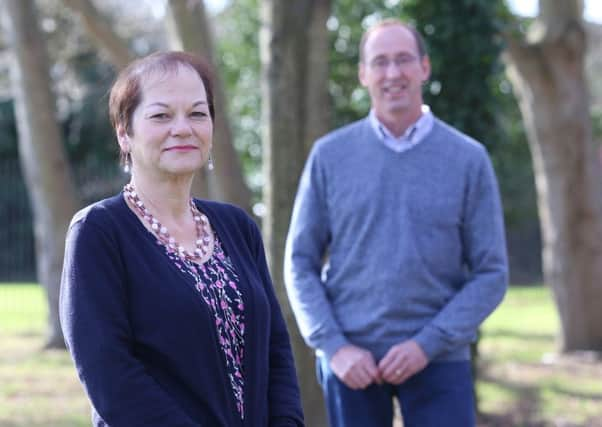'˜It's about making the most of what we have'


The 58-year-old from Stubbington was a hard-working man with a career and a family.
He spent 30 years in the Royal Navy and then left for a career in IT as a customer manager, travelling all over the country.
Advertisement
Hide AdAdvertisement
Hide AdBut all that changed within just a few days when he was rushed to hospital with a serious brain injury back in October, 2014.
Now his life is very different. But thanks to brain injury charity Headway, he has learned to deal with it.
‘It started with a series of headaches and they hadn’t cleared up so we went to the GP,’ Paul says. ‘He prescribed some strong painkillers but they didn’t work and we had to go back for a second time.
‘On the third occasion, he said I didn’t look very well and I was sent to QA Hospital.’
Advertisement
Hide AdAdvertisement
Hide AdPaul had a CT scan and from there he was sent straight to Southampton General by ambulance for an MRI scan.
Doctors said there was something significant on the brain, but they couldn’t tell what it was unless they carried out an operation.
He and wife Helen, 57, were told it was either an abscess or a tumour.
Helen recalls: ‘It was like I was numb,. The doctor said it’s either an abscess or a tumour but we don’t know which. You know whichever way it’s going, it’s going to be bad.’
Advertisement
Hide AdAdvertisement
Hide AdWithin 36 hours Paul underwent surgery and surgeons discovered it was an abscess.
Six days later, Paul had another operation to try and clear the abscess.
He was told he would need to remain in hospital for between four and six weeks to ensure that the infection didn’t return. He was transferred back to QA for his recovery.
‘I was just fed up with being in hospital,’ he says.
‘I wanted to go home. It was a difficult time. There was a lack of understanding from me, but that was part of the brain injury at the time.
Advertisement
Hide AdAdvertisement
Hide Ad‘One of the things about a brain injury is that mentally you feel no different. Nothing has changed in your head.
‘As it was a right side brain injury, it affected my left side but it also affected my short term memory. It affects your mood and behavioural aspects. But you don’t recognise that very easily.’
He adds: ‘My levels of concentration are now very poor. I get mood swings and depression. I’m more emotional now than I was before. I get more upset about things that I wouldn’t have done previously.’
Paul and Helen have two daughters. At the time, the youngest, Caroline, had just started at university, so Helen and other daughter Stephanie drove up to Winchester, where she was studying ,to break the news to her.
Advertisement
Hide AdAdvertisement
Hide Ad‘We just stood in the middle of the room and just cried our eyes out, all three of us just hugging each other,’ Helen says.
‘We didn’t let go for quite a long time. The girls didn’t know what to do.
‘After the operation he was really inappropriate.He was swearing a lot. He was behaving one minute like a five-year-old and the next like a teenager.’
Paul says the recovery was tough.
‘I was in denial for the first 18 months. It was only through the introduction of the charity Headway that I began to understand what the brain injury meant. That was quite difficult to accept.
Advertisement
Hide AdAdvertisement
Hide Ad‘If you feel no different inside but something has changed, how can you address all of that?
‘It’s the frustration of not being able to do things. Everything is much slower.’
Now Paul works part-time. He is no longer able to drive and only occasionally goes into the office, finding it easier to work from home.
The year after Paul’s brain injury, he and Helen went on a cruise to Canada. But while on board, Paul suffered a seizure and had to spend time in hospital.
Advertisement
Hide AdAdvertisement
Hide AdIt set him back further in his recovery as he found he was unable to work for the rest of the year.
He is now on regular medication.
‘It makes me tired,’ he says.
‘My sleep pattern is very disrupted. That’s just part of it. I have had to learn to adjust and the family has had to adjust to that.
‘Headway provides support for myself and Helen and helps me understand what the changes have been.
‘In the group we all come from similar backgrounds. You are able to share your own experiences.’
Advertisement
Hide AdAdvertisement
Hide AdPaul adds: ‘Now it’s about making the most of what we have today.’
Helen says: ‘A brain injury doesn’t just affect the person – it’s the family as well. Our lives have changed dramatically.’
HEADWAY
What are the causes of a brain injury?
It’s varied but they can include a stroke, a traumatic assault, a fall, a road accident, a brain tumour, a work accident, or a brain haemorrhage.
How can it affect your brain?
A brain injury affects everything about the way you control your body including slowed responses, lack of initiative, inappropriate behaviour, poor communication, loss of physical senses, poor memory and personality changes.
How can Headway help?
Advertisement
Hide AdAdvertisement
Hide AdHeadway runs courses to build confidence, skills and employability. Staff offer support and advice, run weekly groups with activities in various areas, and help to improve health and wellbeing.
The charity also lobbies for improved services locally for people with a brain injury.
Headway runs different courses for people, including a confidence course and cognitive therapy.
This year, the charity marked its 30th anniversary and has held celebrations throughout the year.
To find out more about the charity and to make a donation, please visit headwayportsmouth.co.uk.